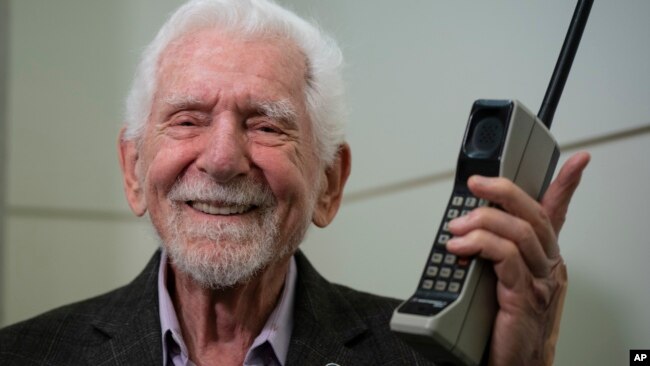すごい技術革新の中で生きてきました。
黒電話から掌サイズの携帯まで。
さらにはウエアラブルの健康管理もすでに組み込まれています。
今後、どんな革新を目にすることになるのでしょうか。楽しみです!!
VOAで英語を学びましょう!!
でも、翻訳機の性能は飛躍的に向上していますし、もう学ばなくてもいい時代がそこまできているかもしれません。
携帯電話、誕生から50周年(和訳)
Cellphone Celebrates 50 Years in Existence
April 05, 2023
最初の携帯電話が発明されたのは、今から50年前の今週。その携帯電話を作った男性、マーティン・クーパー氏は現在94歳です。
”携帯電話の父”と呼ばれるクーパー氏は、私たちの世界を大きく変えたデバイスを作るために努力したことを振り返りながら、メディアの取材に答えています。
1970年代初頭、クーパー氏はアメリカのテクノロジー企業モトローラに勤めていました。当時、モトローラをはじめとするメーカー各社は、車内でも使え、持ち運びもできる無線電話を作ろうとしていました。
モトローラ、ベル研究所、AT&Tの3社で、真に携帯できる最初の携帯電話を作ろうと、激しい競争が繰り広げられていました。最初の携帯電話を作るために使われた技術は、セルラーと呼ばれるものです。この技術では、多数の小型の相互接続された送信機を使用して無線信号を発し、携帯電話をインターネットに接続します。
クーパー氏は1973年4月3、ニューヨークで携帯型ポータブル電話から初めて公衆電話をかけました。Dyna-TACと呼ばれるこの装置は、重さ約1キロ、長さ28センチでした。
彼は、モトローラのチームと5カ月かけてこの電話を開発しました。最初のモデルは、約25分の通話が可能でした。クーパー氏は、「この電話はとても重く、25分も持ち続けることはできません」ですから、このような通話時間は問題はないと指摘しました。
その時のことをAP通信に語ったクーパー氏は、「心配していたのはただ一つ: 『これは使えるのだろうか 』と。そして、そうなったんだ。」と言います。クーパーは当時、「これが歴史的瞬間であることを知る由もなかった 」と認めています。
クーパー氏は、自分の発明が携帯電話ユーザーに一連の技術の可能性を開いたことを喜ぶ一方で、多くの人が自分のデバイスにあまりにも執着していると考えています。
「私は、道を渡っている人が携帯電話を見ているのを見ると、打ちのめされます。彼らは気が狂っています」とクーパー氏はAPに語ります。「でも、何人か車にひかれたりしたら、そのうちわかるようになるよ」と冗談交じりに話してくれました。
現在、クーパー氏は後発のiPhoneを使っています。メールを読んだり、YouTubeを見たり、補聴器を操作したりと、いろいろなことができて気に入っています。しかし、ほとんどの場合、人と話すために使っていると言います。
クーパー氏は、携帯電話の現代的な進歩は、今後もずっと続いていくだろうと言います。携帯電話は"体にはりめぐられる”ところまで発展し、センサーが”常に健康状態を測定する”ようになると彼は予測します。
クーパー氏は、バッテリーが人間のエネルギーに取って代わられる可能性さえあるといいます。「あなたは食べ物を摂取し、エネルギーを作り出します。この耳用のレシーバーを皮膚の下に埋め込み、体から電力を供給するのはどうだろう?」と想像しています。
しかし、携帯電話の発明者は、このデバイスがユーザーにとって、特にプライバシーの分野で深刻なリスクを生み出していることに懸念を表明しています。「私の最も否定的な意見は、私たちのすべてがどこかに記録されているため、私たちにはもうプライバシーがないということです」とクーパー氏は話します。
しかし、彼は、携帯電話が人類に大きく貢献できるような形で進歩し続けることに期待している、と述べました。「各世代はより賢くなる...彼らは携帯電話をより効果的に使用する方法を学ぶだろう 」とクーパーは言っています。「人間は遅かれ早かれそれを理解します。」
Cellphone Celebrates 50 Years in Existence
The first cellphone was invented fifty years ago this week. The man who built that phone, Martin Cooper, is now 94 years old.
Cooper, who has been called the “father of the cellphone,” has been speaking with the media as he looks back at his efforts to create a device that greatly changed our world.
In the early 1970s, Coper worked for American technology company Motorola. At the time, Motorola and other manufacturers were attempting to create wireless phones that could work in vehicles and also be carried.
There was intense competition between Motorola, Bell Labs and AT&T to build the first truly portable phone. The technology used to create the first cellphone is known as cellular. This technology uses many small, interconnected transmitters that give off wireless signals and connect cellphones to the internet.
Cooper made the first public call from a handheld portable telephone in New York City on April 3, 1973. The device, called Dyna-TAC, weighed about 1 kilogram and was 28 centimeters long.
He developed the phone with his team at Motorola over a period of five months. The first model permitted about 25 minutes of talk time. Cooper noted that such a talk time was not a problem, since “This phone was so heavy, you couldn’t hold it up for 25 minutes.”
Speaking about that moment to The Associated Press, Cooper said, “The only thing that I was worried about: ‘Is this thing going to work?’ And it did.” Cooper admitted that at the time, “We had no way of knowing this was a historic moment.”
While Cooper is pleased that his invention has opened up a series of technological possibilities for cellphone users, he thinks many people are just too obsessed with their devices.
"I am devastated when I see somebody crossing the street and looking at their cellphone. They are out of their minds," Cooper told the AP. "But after a few people get run over by cars, they'll figure it out," he joked.
Today, Cooper uses a late model iPhone. He likes that the phone permits him to do numerous things, such as read emails, watch YouTube and control his hearing aid devices. But mostly, he says he uses the phone just to talk to people.
Cooper said the modern progress of cellphones is sure to continue long into the future. He predicts phones will develop to the point of being able to be “distributed on your body,” with sensors “measuring your health at all times.”
Cooper said batteries could even be replaced by human energy. “You ingest food, you create energy. Why not have this receiver for your ear embedded under your skin, powered by your body?” he imagined.
But the cellphone inventor has also expressed worries about how the device has created serious risks for users, especially in the area of privacy. “My most negative opinion is we don’t have any privacy anymore because everything about us is now recorded someplace,” Cooper said.
But, he noted he is hopeful that cellphones will continue to progress in ways that can greatly help humanity. "Each generation is going to be smarter...They will learn how to use the cellphone more effectively,” Cooper said. "Humans sooner or later figure it out."
Words in This Story
cellphone – n. a mobile phone
portable – adj. able to be carried
transmitter – n. a piece of equipment used to send out signals for radio, television, telephone, etc.
obsessed – adj. to think about something or someone all the time
devastate – v. to destroy or damage something very badly
distribute – v. to give something out to people or places
battery – n. an object that provides electricity for things such as radios, toys, cars, etc.
embed – v. to fix something firmly into a substance
negative – adj. not expecting good outcomes
